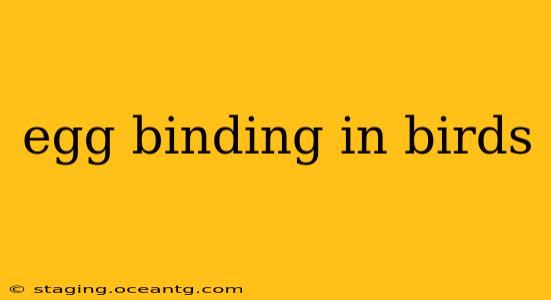Egg binding, a frightening condition for bird owners, occurs when a hen is unable to lay an egg. This can be a life-threatening emergency, requiring swift action. Understanding the causes, recognizing the symptoms, and knowing when to seek veterinary care are crucial for ensuring the well-being of your feathered friend. This comprehensive guide will explore everything you need to know about egg binding in birds.
What Causes Egg Binding in Birds?
Several factors can contribute to egg binding. It's often a complex interplay of various issues, rather than a single cause. Let's delve into the most common culprits:
-
Obesity: Overweight birds are more prone to egg binding because of the added pressure on the reproductive tract. Maintaining a healthy weight through proper diet and exercise is vital for preventing this complication.
-
Dehydration: Proper hydration is essential for egg lubrication. Dehydrated birds may struggle to pass an egg due to insufficient lubrication. Ensuring access to fresh water is paramount.
-
Calcium Deficiency: Calcium is vital for eggshell formation. A deficiency can lead to soft-shelled or abnormally shaped eggs, making expulsion difficult. Providing a calcium-rich diet or supplements (under veterinary guidance) is crucial.
-
Weak Muscles: Weak abdominal and pelvic muscles can hinder the bird's ability to lay an egg. This can be exacerbated by lack of exercise or underlying health conditions. Regular gentle exercise, as appropriate for the bird species, is recommended.
-
Stress: Environmental stress, including changes in surroundings, loud noises, or interactions with other birds, can impact egg laying and increase the risk of egg binding. Providing a calm and stable environment is crucial for bird health.
-
Egg Size or Shape Abnormalities: Overly large or abnormally shaped eggs can become lodged in the reproductive tract. This can be due to genetic factors or nutritional deficiencies.
-
Infection: Infections of the reproductive tract can cause inflammation and swelling, obstructing egg passage. Veterinary intervention is necessary to treat any infection.
-
Age: Older birds are more susceptible to egg binding due to age-related weakening of muscles and potential health issues.
-
Breed Predisposition: Certain bird breeds are more prone to egg binding than others due to their genetic predispositions.
What are the Symptoms of Egg Binding?
Recognizing the symptoms of egg binding is critical for timely intervention. Common signs include:
- Straining: The bird will exhibit noticeable straining behavior, often accompanied by panting or breathing difficulties.
- Swelling of the abdomen: The abdomen may appear swollen or distended.
- Loss of appetite: A lack of interest in food is a common symptom.
- Lethargy: The bird may appear lethargic, sleepy, or less active than usual.
- Depression: A change in behavior, including decreased vocalizations and interaction, could indicate distress.
- Sitting hunched over: The bird may sit with its body hunched over, indicating discomfort.
- Difficulty perching: Problems perching can be related to abdominal discomfort.
Note: If you observe any of these symptoms, seek veterinary assistance immediately. Egg binding is a veterinary emergency.
How is Egg Binding Diagnosed and Treated?
Diagnosis typically involves a physical examination by an avian veterinarian. The vet may palpate the abdomen to feel for the presence of an egg. In some cases, radiographs (X-rays) might be needed to confirm the diagnosis and assess the egg's position.
Treatment depends on the severity of the condition and may include:
- Warm Baths: Gentle warm baths can help relax the muscles and facilitate egg passage. Never attempt this without veterinary guidance.
- Lubrication: The veterinarian may apply lubrication to the cloaca to aid in egg passage.
- Manual Removal: In some cases, the veterinarian may need to manually remove the egg. This procedure should only be done by a qualified professional.
- Medication: Medications may be prescribed to help relax the muscles or treat any underlying infections.
What are the Long-Term Effects of Egg Binding?
Untreated egg binding can lead to serious complications, including:
- Death: If the egg remains lodged, it can lead to rupture of the reproductive tract, internal bleeding, and death.
- Infection: A trapped egg can cause a bacterial infection.
- Prolapse: Part of the reproductive tract might protrude from the cloaca.
- Infertility: In some cases, egg binding can result in future fertility issues.
How Can I Prevent Egg Binding in My Bird?
Preventive measures play a crucial role in minimizing the risk of egg binding. These include:
- Maintain a healthy weight: Avoid overfeeding and provide ample opportunity for exercise.
- Provide a calcium-rich diet: Offer a diet that includes calcium-rich foods or supplements (under veterinary guidance).
- Ensure adequate hydration: Always provide fresh, clean water.
- Minimize stress: Create a calm and stable environment for your bird.
- Regular Veterinary Checkups: Routine veterinary checkups are vital for early detection of potential problems.
Can Egg Binding Happen in Male Birds?
No, egg binding cannot occur in male birds as they do not lay eggs.
How Long Can a Bird Survive with Egg Binding?
The survival time depends on the severity of the condition and access to veterinary care. Without treatment, egg binding is often fatal.
What Should I Do If I Suspect My Bird Has Egg Binding?
Seek immediate veterinary attention. Egg binding is a life-threatening emergency, requiring swift action from a qualified avian veterinarian. Do not attempt home remedies without professional guidance.
Remember, early detection and veterinary intervention are key to a successful outcome. Providing your bird with a healthy diet, a stress-free environment, and regular veterinary care are crucial for preventing egg binding and maintaining their overall well-being.
